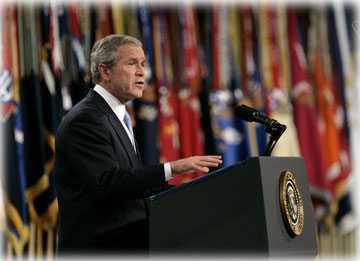 By DAVID WESTPHAL McClatchy Newspapers June 29, 2005
But with his political clout on the line, President Bush drew a line in the sand Tuesday night about the war in Iraq, warning that a hasty exit from the bloody insurgency would amount to waving a white flag in the face of Osama bin Ladin and the cause of terrorism.
Bush's speech before 82nd Airborne troops at North Carolina's Fort Bragg was a pivotal one, not only for his ability to maintain support for an increasingly unpopular war but for his overall second-term standing, which has hit unexpectedly rocky going just months after his re-election. Bush's answer was to return to the 9/11 themes upon which his presidency came of age, saying the same resolve is needed now that Americans showed after being attacked by suicide hijackers. The president in recent days has come under new scrutiny for tying Iraq to the attacks on the United States, but he showed no hesitation in reaffirming the link, mentioning the terrorist strike five times in his speech. "After September 11, 2001, I told the American people that the road ahead would be difficult - and that we would prevail," Bush said. "Well, it has been difficult. And we are prevailing." More than in previous speeches, the president raised doubts increasingly voiced by Americans about the war, and attached his answers. Why not send more troops? Because it would "undermine our strategy of encouraging Iraqis to take the lead in this fight." Why not establish an exit timetable? "It would send the wrong message to the enemy, who would know that all they have to do is to wait us out." Is Iraq really a "central front" in the fight against terror? Terrorists, he said, "know that the outcome will leave them emboldened, or defeated." He also sought to change the context by which daily war reports are viewed, suggesting that the attacks that often dominate news coverage aren't the most important barometer in judging how Iraq's transformation is faring. Citing a long list of political accomplishments in Iraq since Saddam Hussein's overthrow, Bush said, "The terrorists can kill the innocent, but they cannot stop the advance of freedom. The only way our enemies can succeed is if we forget the lessons of September 11." Coming at a time when his own political standing has taken a beating, Bush's speech was being closely watched to determine his ability to rally popular support for staying the course in Iraq. In a pre-speech survey by the Washington Post-ABC News poll, Americans overwhelmingly concluded that the United States is "bogged down" in Iraq; a smaller majority said the war has not been worth its cost. Over the last week, a parade of top administration officials and military commanders have been acknowledging what increasing numbers of Americans had already concluded - that the insurgency in Iraq was showing few signs of weakness, that the fighting could go on for many more years, that the insurgents might never be defeated except by Iraq's own army. Bush went partway down that road in his speech, delivered one year after the United States' coalition transferred sovereignty to Iraq authorities. Bush spoke bluntly about the difficulties U.S. troops are encountering in Iraq. "Like most Americans, I see the images of violence and bloodshed," he said. "Every picture is horrifying - and the suffering is real. Amid all this violence, I know Americans ask the question: Is the sacrifice worth it?" His answer - that the Iraq conflict is "vital to the future security of our country" - signaled Bush's real mission Tuesday night: to stiffen the nation's spine and put an end to growing calls, some of them from his own party, to set a timetable for withdrawal from Iraq. The same poll that showed growing doubts about Iraq also spotlighted a decided reluctance to go home too soon. Seven of eight Americans said they opposed an immediate pullout, and it's that sentiment that Bush focused on in perhaps his most detailed report ever about Iraq. "The American people do not falter under threat," he said, "and we will not allow our future to be determined by car bombers and assassins." Bush's flagging clout as Iraq war architect is due mostly to the inability of U.S. troops to quell an insurgency that the administration never expected to develop in the first place. But it also is related to the president's post-inaugural decision to spend enormous amounts of political capital touting a Social Security plan that turned out to be an exceedingly hard sell. Iraq has taken a clear back seat to Bush's desire to make history overhauling Social Security. Those twin dynamics have pushed down Bush's approval ratings to the lowest of his presidency.
Publish A Letter on SitNews Read Letters/Opinions Submit A Letter to the Editor
|
||
